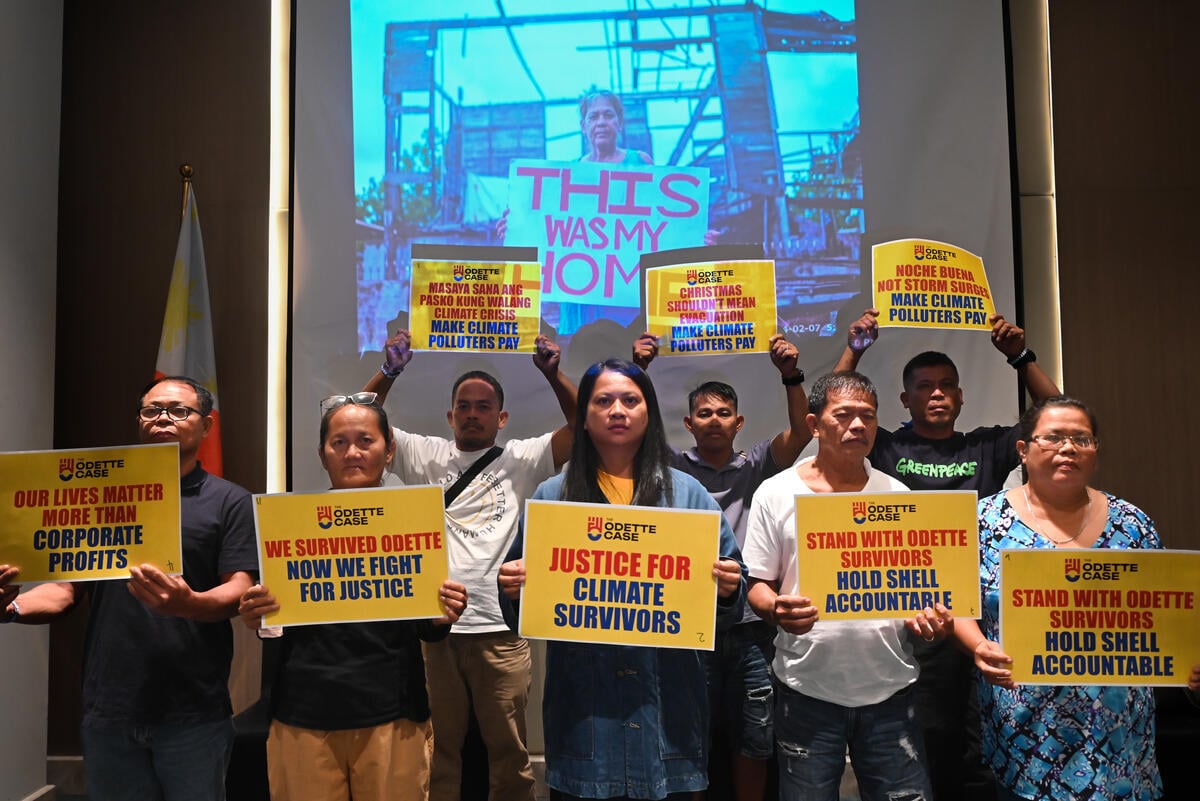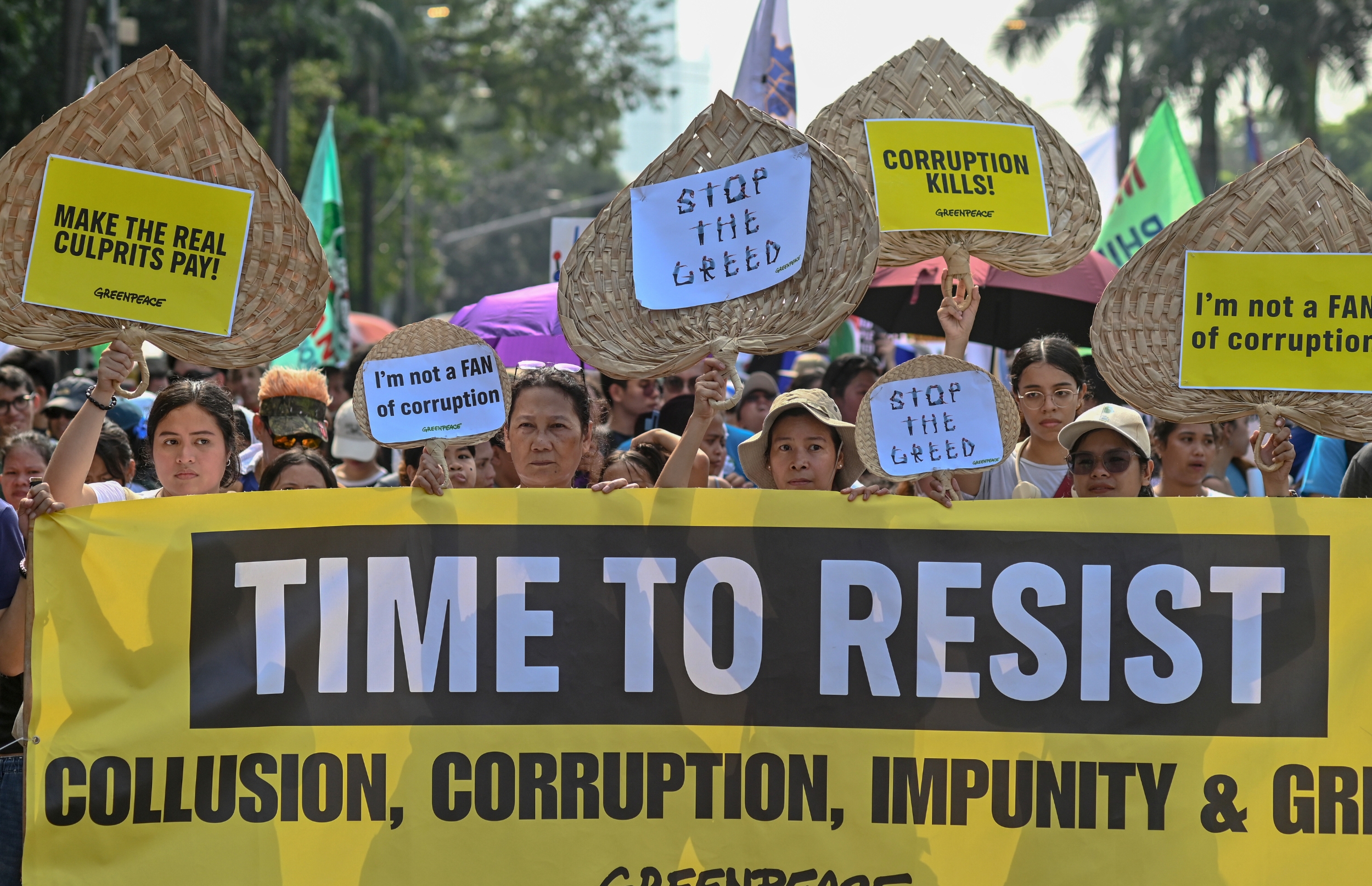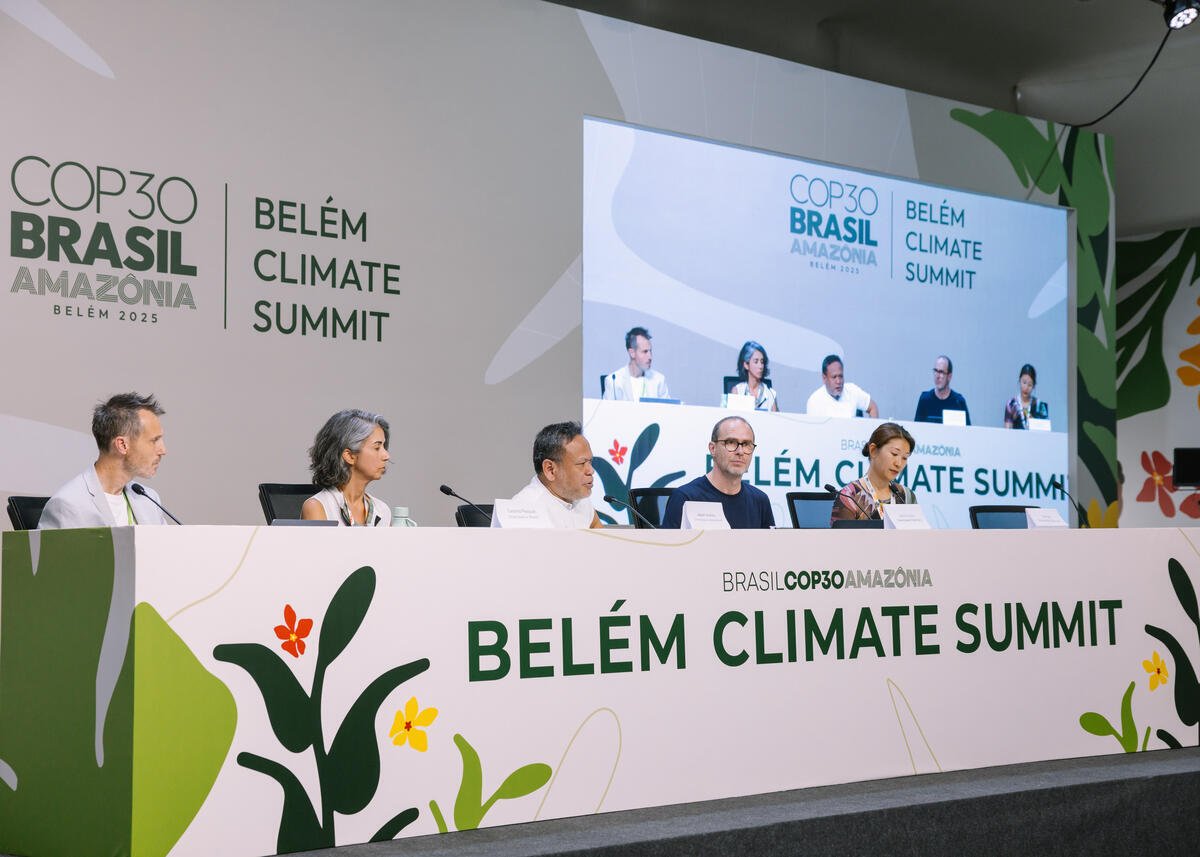Quezon City, 7 May 2024—Advocates today called on the Philippine government to champion the Climate Damages Tax, a mechanism imposing levies on the continued operations of fossil fuel companies to fund loss and damage financing. The call was made in a press conference organized by Greenpeace Philippines in Quezon City, following the recent release of a report on taxing fossil fuel extraction. This comes at a time when the country grapples with record-breaking heat due to a strong El Niño, and is currently preparing for a highly probable La Niña event which could result in more damaging tropical cyclones in the latter half of the year.
The Climate Damages Tax (CDT) report is backed by over 100 climate organizations worldwide including Greenpeace, Stamp Out Poverty, Power Shift Africa and Christian Aid. It proposes that the Organisation for Economic Co-operation and Development (OECD) countries, in particular members of the G7, lead in introducing a fee per tonne of CO2 embedded (CO2e) within the domestic extraction of coal, oil and fossil gas. This fee, pegged at USD 5 per tonne of carbon dioxide equivalent, will be ratcheted up annually, which also serves as a disincentive to continue fossil fuel extraction. In total, the tax could raise USD 720B by the end of the decade to support the world’s most vulnerable facing climate damages.[1]
The Philippines has for decades been battered by severe climate impacts such as extreme weather in the form of super typhoons and drought, and faces slow onset impacts such as sea level rise. The Department of Finance estimated that the country suffered around USD 10B in damages from climate hazards from 2010 to 2020[2]. This year, the country has already incurred at least PHP 5.9B in damages due to an ongoing El Niño[3] even as it prepares for the onslaught of a probable La Niña during the second half of the year.
Greenpeace says that the country will continue to lose more if climate accountability mechanisms are not put in place while oil and fossil gas companies continue to do business as usual and even expand their operations. The group says that the country stands to gain from CDT because it hastens the collection of much-needed loss and damage financing, and makes carbon majors pay for their continued operations. CDT should work in conjunction with other climate accountability systems, like the Climate Accountability Bill (CLIMA Bill) which was filed in the Philippine Congress last year[4].
“Super typhoon Odette was one of, if not the most, horrifying experiences I’ve ever had,” a frontline community member from Barangay Melgar, Basilisa, Dinagat Islands, Frank Nicol Marba shared, “at the peak of its strength, Odette caused the floor and the walls of our house to tremble.” Melgar, currently a Sangguniang Barangay Member, saw what extreme weather events can do to a vulnerable community. “Odette’s destruction was more visible in the morning; houses were practically hammered to the ground, and boats that were securely tied before the typhoon were out of sight. Until now, every news report on weather disturbances sends me back to that traumatic experience. I don’t think I will ever recover from that,” Melgar added.
“The Philippines cannot afford to—and should not—keep paying the price for losses and damages from climate impacts caused by the world’s biggest climate polluters. The government must demand payment from oil and gas companies and ensure mechanisms for payment and accountability, such as the Climate Damages Tax, are implemented,” said Greenpeace campaigner Jefferson Chua.
Groups behind the report say that the CDT should be operationalized as part of a comprehensive framework to not only disincentivize fossil fuel dependence but also to close the gap between escalating community adaptation needs and the actual money on the pot.
“The Climate Damage Tax (CDT) is one good alternative financing source for the operationalization of the Loss and Damage Fund being discussed now under the UNFCCC,” Independent Climate Change Specialist, Dr. Rosa Perez said. “The CDT revenue would benefit climate-susceptible developing countries by aiding, for example, in the rebuilding-recovery process through reconstruction of stronger homes and structures post-storms; provision of emergency cash assistance to those who lost everything; funding social programs during severe droughts, and covering the expenses of relocation and retraining for workers in sectors like agriculture, fishing, and tourism, whose resources were adversely affected by climate change.”
The CDT report comes just in time for the annual general meetings of the biggest fossil fuel companies this month. As it is expected that they will report billions in profit, Greenpeace says it is imperative to highlight that these profits come from the suffering of frontline and vulnerable communities heavily impacted by the climate crisis. The group is calling on the Philippine government to heed the call for urgent climate action and support local and international efforts that will make climate polluters pay and justly transition away from fossil fuels.
“It is in the best interest of the administration to pursue such a mechanism, especially in the context of its desire to host the loss and damage facility and in pursuit of the recommendations of the Commission on Human Rights final report on the National Inquiry on Climate Change[5]. If President Marcos Jr. is sincere with his pronouncements when he talks about solutions to the climate crisis, he will heed the clamor of communities who are standing up to carbon majors. By championing mechanisms in the global stage such as the CDT, and passing the CLIMA bill, the government is giving these communities and our country a fighting chance to take control of our own future—a future free from fossil fuel dependence,” Chua added.
PLEASE USE THIS FOR PHOTO CREDIT: © Alecs Ongcal / Greenpeace
LINK TO PHOTOS THAT CAN BE USED HERE.
NOTES:
[2] Climate-related hazards led to US$10-B losses for low-carbon emission PHL over 10-year period
[3] DA: Agri damage due to El Niño hits P5.9-B | Philippine News Agency (pna.gov.ph)
[4] Philippine congress files world’s first climate accountability bill – Greenpeace Philippines
[5] The Climate Change & Human Rights Inquiry Archive – Greenpeace Philippines | National Inquiry on Climate Change Report (greenpeace.org)
MEDIA CONTACT:
Karl Orit, Greenpeace Communications Campaigner[email protected] | +63 9194571064



